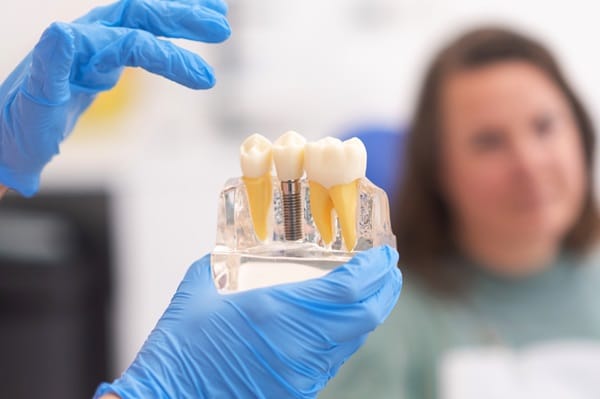5 Tips to Prevent Dental Implant Failure

So…
Five tips for dental implant success
#1 – Be a Good Candidate for Dental Implants
Not everyone who wants a dental implant should get one. Instead, dental implants require that you be an ideal candidate. An ideal candidate needs to be in relatively good general health, have healthy gums and adequate bone tissue. Adequate gums and bone tissue are mandatory requirements to support the implant post.
Additionally, being too young can also exclude someone from receiving a dental implant. This fact is considering those who are still growing and developing their jaw and facial bones have most likely not finished forming until they are in their 20s.
#2 – Stop Smoking
Are you a smoker? If so, you may want to quit smoking before and after receiving a procedure, as smoking is directly related to a higher dental implant loss than those who do not. Additionally, any level of gum disease that results from smoking can also be a risk factor that causes dental implants to failure, so be sure that you and your dentist take care of this problem before considering a dental implant.
#3 – Preventing Peri-implantitis
One of the more common causes of implant failure, peri-implantitis occurs when the gum and bone tissue around your implant becomes inflamed, which can lead to significant complications like bone loss and dental implant failure. Many studies link peri-implantitis to dentist errors, including gum tissue malformations, using excess cement in placement, and failure to remove every trace of bacteria and plaque from the implant site.
As a patient, it is up to you do your research on your dentist beforehand. Consult several sources, including the Better Business Bureau and just asking patients about any complications they may have had with their dental implants. If you hear about too many dental implant failures, you should look for another dentist/oral surgeon with a proven track record.
#4 – Practice Regular Hygiene
It seems like a no-brainer, but the best way to keep your dental implants healthy is to practice good oral hygiene. Brushing your teeth and flossing twice daily should be a part of your routine, as well as using an alcohol-free antibacterial mouthwash.
#5 – Eat Healthy
Your diet has a direct effect on whether your dental implant will stay in your mouth or fail. While dental implants should mimic the usage of your natural teeth, try to avoid eating foods that can overtax the implant—especially during the osseointegration phase. You should avoid hard candies and tough baked goods, like pretzels, but also avoid overly-sugary foods that can cause bacteria growth and complicate your dental implant.
Now:
Call (408) 226-5560 today to reach Dennis Baik, DDS.
[recent-blogs count=4 layout=”horizontal” category=”dental-implants-cat,dental-implant-candidate-cat,post-op-care-for-dental-implants-cat,the-dental-implant-procedure-cat,dental-implant-surgery-cat,dental-implant-restoration-cat,implant-dentist-cat”]


